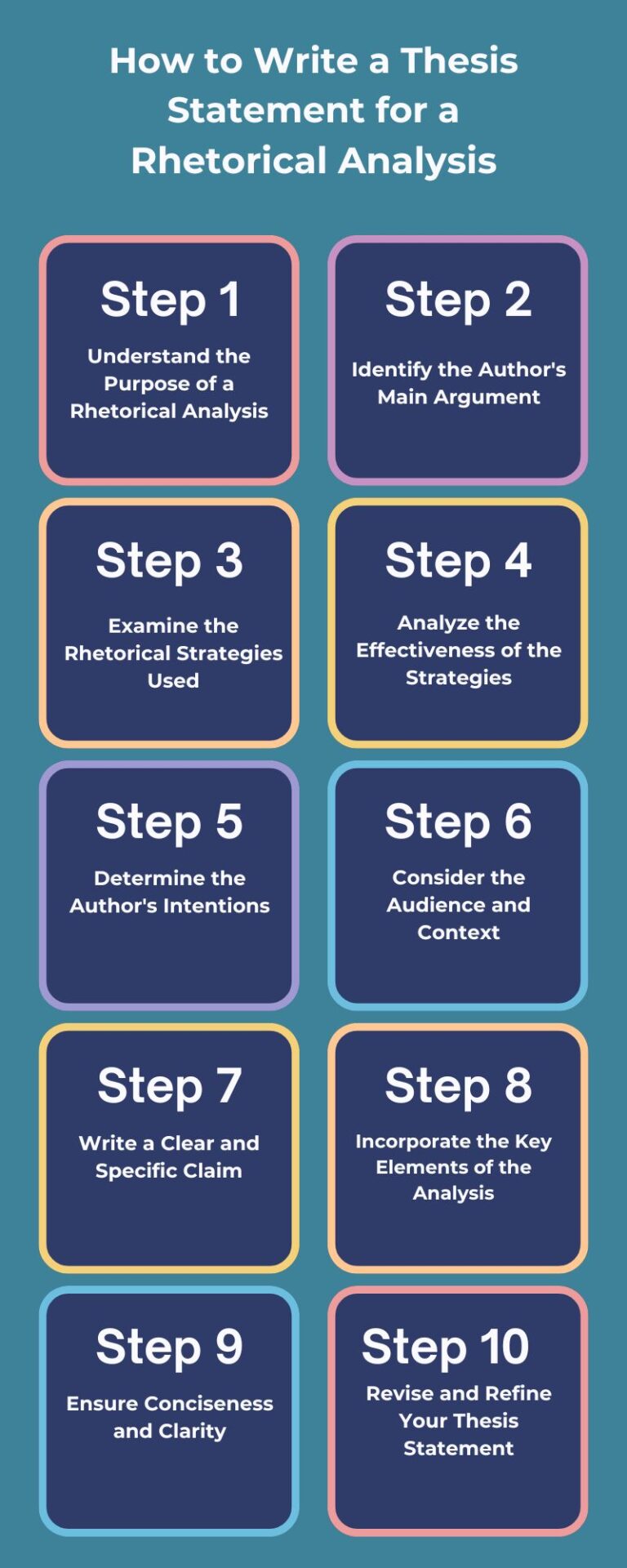Essay Writing Guides
How to Write a Thesis Statement for a Rhetorical Analysis in 10 Steps


A powerful thesis statement is the backbone of a successful rhetorical analysis essay. It guides you, the writer, and your audience through the author’s persuasive techniques. Writing a clear, concise, and insightful thesis may seem daunting, but it becomes much more straightforward with the right approach. Here’s a structured guide to help you develop an effective thesis statement for your rhetorical analysis:
Step 1: Understand the purpose of a rhetorical analysis
Step 2: Identify the author’s main argument
Step 3: Examine the rhetorical strategies used
Step 4: Analyze the effectiveness of the strategies
Step 5: Determine the author’s intentions
A rhetorical analysis thesis statement encapsulates the main argument you’ll delve into in your essay. It outlines how the author utilizes various rhetorical tools – such as word choice, descriptive language, and sentence structure – to achieve a specific effect on the audience.
When writing a thesis, consider these three key components:
- Identification: Specify the text you’re analyzing, including the author and the type of work (e.g., speech, essay, or advertisement).
- Methods: Highlight the specific methods of persuasion the author employs.
- Impact: Explain the overall effect these strategies have on the audience.
A well-written thesis provides a clear roadmap for your essay and keeps you focused during the writing process. Let’s dive into the best practices for creating impactful rhetorical analysis thesis statements. And remember, expert help is always available online through our custom essay service if you need it.

Is Your Rhetorical Analysis Thesis Stuck in "The Author Uses...?"
Let us ditch the generic and use the power of a truly insightful thesis!
How to Write a Thesis Statement for a Rhetorical Analysis
In the following sections, we will simplify the process of writing a thesis statement for a rhetorical analysis into easy-to-follow steps. Following these steps, you can craft a clear and compelling thesis statement that effectively guides your analysis.

Understand the Purpose of a Rhetorical Analysis
To concentrate on how the author’s decisions influence the audience, it’s crucial to comprehend the purpose of a rhetorical analysis. By identifying the primary strategies, you can more effectively explain how the author’s techniques contribute to the overall message.
For example, does the author employ emotional appeals to generate empathy? Do they use logical reasoning to persuade the audience of their argument? Or do they lean on their credibility and authority to convince the readers? Recognizing these elements will help you craft a robust thesis statement that captures the essence of your analysis.
Identify the Author's Main Argument
The next step is to pinpoint the author’s core argument or central claim, as your analysis will focus on how effectively this point is conveyed and supported. This is the primary idea the author wants the audience to understand or act upon.
To identify the core argument, consider the following questions:
- What is the author trying to convince the audience to think or do?
- What is the central message of the text?
Determining the author’s core argument allows you to analyze the specific rhetorical techniques employed to bolster this claim.
Examine the Rhetorical Strategies Used
After pinpointing the author’s main argument, the next crucial step is to analyze their rhetorical techniques to bolster their message. These techniques, designed to persuade the audience, often encompass ethos (credibility), pathos (emotional appeal), and logos (logical argument).
Ethos: Assess how the author establishes their credibility. Do they highlight their expertise, reference trustworthy sources, or showcase their understanding of the topic?
Pathos: Identify how the author appeals to emotions. Do they use evocative language, share personal stories, or present emotional narratives to forge a connection with the audience?
Logos: Examine the logical structure of the argument. Does the author present facts, statistics, logical reasoning, or evidence to substantiate their claims?
By thoroughly analyzing these techniques, you’ll gain insight into how the author constructs their argument, which will serve as a foundation for your thesis statement in the rhetorical analysis.
Analyze the Effectiveness of the Strategies
Once you have identified the rhetorical strategies employed by the author, the next step is to evaluate their effectiveness. This involves assessing how well these strategies successfully persuade the audience and reinforce the author’s main argument.
Consider these questions during your evaluation:
- Do the strategies bolster the author’s credibility? Does the use of ethos make the author seem knowledgeable and trustworthy?
- Are the emotional appeals effective? Does pathos connect with the audience and provoke the intended emotions?
- Is the logical reasoning persuasive? Does the use of logos offer strong evidence and clear logic that support the author’s claims?
By answering these questions, you can provide a thorough assessment of the strategies used and your analysis of their success in persuading the audience.
Determine the Author's Intentions
Identifying the author’s goals can sometimes be challenging, as they may have multiple reasons for writing or may convey their main point subtly. This is where meticulous reading becomes crucial. While crafting your rhetorical analysis thesis statement, pay attention to the author’s word choice, the structure of their arguments, and the emotions they aim to evoke. This careful analysis will help you uncover the author’s true objectives.
Consider why the author wrote the text. What outcomes are they aiming for? The author’s intentions could range from persuading the audience to adopt a particular perspective, motivating them to take action, providing information on a topic, or simply entertaining them. Understanding these goals is vital in analyzing the author’s writing decisions and assessing their effectiveness.
Consider the Audience and Context
Understanding the audience and context is vital in a rhetorical analysis. Think about who the intended audience is and how the author customizes their message to resonate with that audience. Different audiences react differently to various rhetorical techniques, so recognizing the audience helps you grasp why the author employed specific methods.
Additionally, consider the context in which the text was produced and consumed. Context encompasses the period, cultural background, and circumstances surrounding the text. This information can affect how the audience perceives the message and the rhetorical strategies’ effectiveness.
Write a Clear and Specific Claim
Now that you have a solid grasp of the author’s main argument, their rhetorical strategies, their effectiveness, and the overall context, it’s time to create a compelling thesis statement for your rhetorical analysis.
Your thesis statement should:
- Identify the text, author, and genre: Mention the work you are analyzing.
- State the main argument: Summarize the author’s primary claim.
- Highlight the rhetorical strategies: Point out the key strategies employed by the author.
- Assess their effectiveness: Evaluate how well these strategies support the author’s argument.
Example of a clear and specific thesis statement:
“In her article ‘The Urgency of Climate Action,’ Greta Thunberg employs emotional appeals and factual evidence to argue the need for immediate environmental reforms convincingly.”
This thesis statement identifies the text, author, and genre. It also states the main argument (“the need for immediate environmental reforms”) and highlights specific rhetorical strategies (“emotional appeals and factual evidence”). Lastly, it evaluates the effectiveness of these strategies (“convincingly argue”).
Incorporate the Key Elements of the Analysis
When conducting your analysis, be sure to include the following elements:
Rhetorical Strategies
Identify the author’s techniques to persuade, inform, or entertain their audience. This can include various rhetorical tools such as:
- Appeals: Examine the use of logos (logical reasoning), pathos (emotional appeal), and ethos (credibility).
- Figurative Language: Look for similes, metaphors, personification, and other figurative language.
- Structure and Organization: Analyze how the text is arranged, the use of transitions, and the emphasis placed on specific points.
- Diction (Word Choice): Consider the choice between formal and informal language, the use of technical jargon, and specific words chosen to evoke emotions.
Impact on the Audience
Evaluate how these strategies influence the reader. Assess whether the author successfully achieved their intended purpose. For example:
- Logos: Did the logical arguments effectively convince the reader?
- Pathos: Did the emotional appeals resonate with and move the reader?
- Ethos: Did the author establish themselves as trustworthy and knowledgeable?
You can create a thorough and insightful rhetorical analysis by carefully incorporating and analyzing these essential elements.
Ensure Conciseness and Clarity
To create a strong thesis statement for a rhetorical analysis, focus on being specific and avoiding generic terms. Aim to be analytical rather than merely descriptive; don’t just summarize the content but highlight the author’s choices and impact.
Key Points:
- Mention the text and the author briefly.
- State the author’s primary objective.
- Highlight a few key rhetorical strategies used.
- Provide a brief assessment of the effectiveness of these strategies.
Example (reworked for conciseness):
“Dr. King, in his ‘Letter from Birmingham Jail,’ uses powerful appeals to pathos and logos to convince clergymen of the moral urgency of the civil rights movement.”
Removed for conciseness:
- Unnecessary introductory phrases.
- Redundant information.
Revise and Refine Your Thesis Statement
Finally, refine your thesis statement iteratively to ensure it serves as a robust foundation for your essay. Use the following formula to create a precise statement:
The author of [text title], [author’s name], employs [specific tools] to [author’s purpose].
Here are some tips to keep in mind:
- Eliminate unnecessary words: Concentrate on the essential purpose and tools.
- Be specific: Identify the author’s tools, not just broad categories.
- Use active voice: “The author employs…” is more compelling than “It is demonstrated that…”.
- Bonus Tip: Read your thesis aloud. Ensure it sounds clear and focused.
Tips for Writing a Rhetorical Analysis Thesis Statement
Dos ✅ | Don’ts 🚫 |
Identify the Author’s Purpose: Clearly define what the author aims to accomplish with the text, whether to persuade, inform, or entertain. Your thesis should reflect this purpose. | Summarize the Text: Avoid merely summarizing the content. Your thesis should focus on analyzing the author’s methods. |
Highlight Rhetorical Strategies: Identify the specific strategies the author uses, such as emotional appeals (pathos), logical arguments (logos), or credibility (ethos). | State the Obvious: Avoid general statements like “The author uses persuasive techniques.” Be specific about which techniques and their effects. |
Evaluate the Impact: Discuss how these strategies affect the audience. Do they provoke an emotional response, convince them of a particular viewpoint, or build trust? | Use “I Think” or “This Essay Will.”: Avoid using first-person pronouns or framing the thesis as a plan. Keep a formal tone and make a strong declaration. |
Formulate a Clear Argument: Combine these elements into a clear, concise statement about the author’s success in achieving their purpose. | Make Broad Claims: Steer clear of vague assertions that are hard to substantiate. Focus on specific rhetorical techniques and their impact. |
Strong Rhetorical Analysis Thesis Statement Example
Example: In Martin Luther King Jr.’s “I Have a Dream” speech, King employs a combination of emotional appeal (pathos), repetition, and vivid imagery to inspire hope and motivate his audience to pursue civil rights and equality.
Key Elements to Note:
- Identifies the text and author: “In Martin Luther King Jr.’s ‘I Have a Dream’ speech.”
- Pinpoints rhetorical strategies: “emotional appeal (pathos), repetition, and vivid imagery.”
- The author’s purpose is “to effectively inspire hope and motivate his audience to pursue civil rights and equality.”
This example demonstrates a clear and concise thesis statement that captures the essence of the rhetorical analysis.
Weak Rhetorical Analysis Thesis Statement Example
Example: Martin Luther King Jr. uses persuasive language to convey his message in his speech.
Issues with This Statement:
- Vague Identification: Mentions “his speech” without specifying which speech or giving the title.
- General Rhetorical Strategy: The phrase “uses persuasive language” is too broad and does not identify specific rhetorical techniques.
- Lacks Purpose: Does not clearly state King’s message or purpose.
This example lacks the specificity and detail needed for a strong rhetorical analysis thesis statement.
Final Remarks
Writing a strong thesis statement for a rhetorical analysis is essential for guiding your essay and providing clarity for your readers. You can create a compelling and insightful essay by understanding the purpose of the analysis, identifying the author’s main argument and rhetorical strategies, and refining your thesis statement. Remember to be specific, use an active voice, and continuously revise your thesis to reflect your analysis accurately. With these tips in mind, you’ll be well-equipped to write an effective rhetorical analysis highlighting the author’s persuasive techniques and their impact on the audience. Happy writing!

FAQs
What is a thesis statement in a rhetorical analysis?
A thesis statement in rhetorical analysis is a concise summary of the main argument or point you intend to make in your essay. It identifies the specific text being analyzed, the author’s main strategies for persuasion, and the overall impact of these strategies on the audience. This statement provides a clear direction for your analysis and guides your reader through your argument.
What is an example of an analysis thesis statement?
An example of an analysis thesis statement is: “In his ‘Gettysburg Address,’ Abraham Lincoln utilizes repetition, parallelism, and a solemn tone to honor the fallen soldiers and inspire his audience to continue fighting for unity and equality.”
How to write a good thesis statement for a literary analysis?
To write a good thesis statement for a literary analysis, follow these steps:
- Identify the central theme or message of the literary work.
- Pinpoint key literary devices used by the author, such as symbolism, imagery, or character development.
- Formulate a concise statement that connects these elements to the overall theme. For example: “In ‘The Great Gatsby,’ F. Scott Fitzgerald uses symbolism, character development, and vivid imagery to explore the disillusionment of the American Dream in the 1920s.”
How to start a rhetorical analysis essay?
To start a rhetorical analysis essay, follow these steps:
- Introduce the text and author: Provide the title, author, and context of the work you are analyzing.
- Summarize the central argument or purpose of the text: Briefly outline what the author is trying to achieve.
- Present your thesis statement: Clearly state your thesis, outlining the rhetorical strategies you will analyze and their impact on the audience.
- Provide a roadmap: Briefly mention the key points you will discuss in your analysis to give your reader a sense of direction.
Sources
Hillsborough Community College. Rhetorical Analysis Instructions & Example. https://libguides.hccfl.edu/c.php?g=937858&p=6912911
St Louis Community College. Rhetorical Analysis Sample Essay. https://stlcc.edu/student-support/academic-success-and-tutoring/writing-center/writing-resources/rhetorical-analysis-sample-essay.aspx

